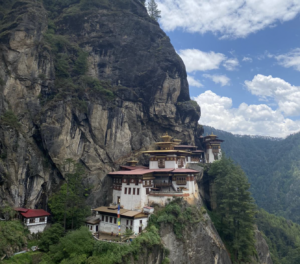
Politics of Being received by His Majesty the King of Bhutan
I have just spent 10 wonderful days in Bhutan, the land of the peaceful dragon, where I was invited to give a keynote on “Education and the Politics of Being” for an international symposium on “reimagining education from a Gross National Happiness perspective”.
In 1972, His Majesty the 4th King of Bhutan replied to an Indian journalist who was trying to humiliate him by asking what Bhutan’s Gross Domestic Product (GDP) is that he thinks Gross National Happiness (GNH) was more important. This proud and spontaneous answer from the leader of one of the few non-western countries that had not been colonized paved the way for the development of GNH, as a unique alternative development philosophy and model rooted in its own indigenous culture. Thanks to it, this country has successfully conserved its pristine nature and its distinct Himalayan culture and traditions, and is among a handful of carbon positive countries in the world.
Indeed, having barely touched Bhutanese ground, I was surprised by the beauty of the Paro international airport and its traditional architecture. I discovered that all Bhutanese buildings, even the most recent ones, by law have to integrate traditional architecture features. This attention to beauty and harmony touched me, as I was just reflecting during my transit in Bangkok how sad it is that most urban dwellings in the world nowadays feel soulless and disregard our natural human need for beauty and harmony.
Politics of Being really felt at home in Bhutan, where it naturally seems to be considered one of the most interesting subjects to discuss. Bhutan has been a great source of inspiration for me and it felt good to give back to the country through my presentations, the few books I had with me to offer, and many meetings with Bhutanese leaders, including His majesty, the 5th king of Bhutan. A friend of mine helped me to schedule a private audience with him during my last day, which was cancelled at the last minute as he was not feeling well. Fortunately, I already had the pleasure to meet him and offer him my book the day before during a visit he made to the Paro college of education for the closing or the symposium (sorry no photo allowed!). About 70 of the international participants gathered in circle around him for a unique, informal one-hour question and answer session in the forecourt of the college.
The Gelephu Mindful City (GMC), a special administrative zone to be created in the southern part of the country to attract foreign investors, was the main topic of discussion. It seems the king is looking to Singapore as an example and wants to attract in particular asset managers to invest from the GMC to Asia, while building a unique learning environment, in which cutting edge technologies meet environmental harmony and wisdom traditions.
I have been very impressed by the king’s enlightened leadership, his wisdom and commitment to serve, his sense of humor and very direct, frank answers. Like his father the 4th king – who in Bhutan is generally considered to be the reincarnation of Ngawang Namgyal (1594–1651), a Buddhist lama who unified Bhutan as a nation-state – he is deeply cherished by all his people and is the subject of religious devotion.
While I could feel in many Bhutanese a special kindness, politeness, and compassion, I don’t want to romanticize Bhutan, which, like every nation, has its own challenges, contradictions and shadows. While GNH seems to have been a great source of cultural inspiration for the Bhutanese, its translation in public policies and institutions seems still relatively incomplete. The prime minister of Bhutan who opened the international symposium said that the Bhutanese live and breathe GNH but they often forget to nurture it. I was surprised to discover that GNH is not even well integrated into the education systems, which should be its natural first priority. This is mainly due to changing political priorities due to political alternance in this young democracy, the lack of resources and probably a certain decrease in political attention to GNH (the GNH commission has been dissolved for example). Rather than idealizing Bhutan, we should rather view it as a laboratory for GNH, a courageous attempt to design an alternative development model to collectively realize universal human values at the core of its Buddhist heritage.
Some 10 to 15 years ago, I unsuccessfully tried to get some work assignments in Bhutan. Sometimes, our intentions do not manifest right away but their power keeps on working. During my first stay in this country, I could feel the power of this intention very present, as doors were opening. I could sense the deep resonance between the politics of being and what wants to manifest there, in particular through the Gelephu Mindful City. His majesty the king has my book and wanted to discuss it with me. A few minutes before I was notified of our meeting being cancelled, someone told me “we have a saying in Bhutan which says : it is good to leave unfinished work, that means you will come back”. Indeed, it seems I should come back to Bhutan soon as part of my work with the UNDP-convened Conscious Food Systems Alliance, for which opportunities for collaboration also emerged during this short stay. But at a deeper level, what I touched during my time in Bhutan, was a feeling that I might well be called in the future to spend a longer time living in this unique country.
